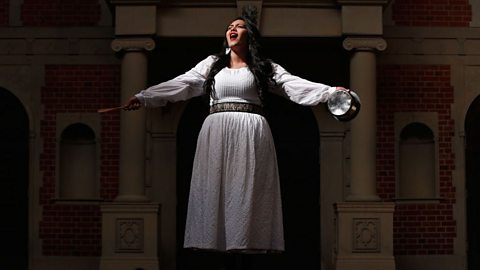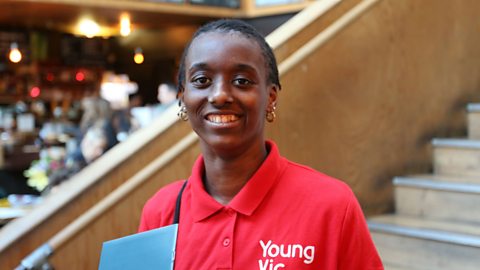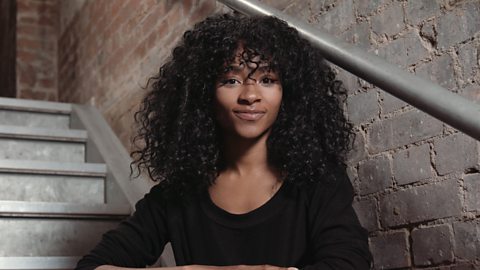More than two thousand people can be accommodated in the audience of LondonÔÇÖs Coliseum. Crowd-wise, thatÔÇÖs a lot bigger than the numbers who paid to see Matthew Durkan play guitar with his band back in the day.
But these days, itÔÇÖs not chords and plectrums the Derby-born musician has to concern himself with. ItÔÇÖs big, booming notes and librettos which keep him busy as a baritone with English National Opera.
His story is inspirational for anyone who feels the operatic world is only for a privileged few, as Matthew made it through that well-trumpeted mix of graft and determination.
ÔÇ£I never really grew up singing,ÔÇØ he tells ┤¾¤¾┤½├¢ Bitesize. ÔÇ£I went on a school trip to see an opera, and I was just absolutely blown away by it. The power of the singing, the music, the staging, it was all incredibleÔǪ such an overwhelming performance that I just thought, ÔÇÿIÔÇÖd love to try thatÔÇÖ.ÔÇØ
And so it was that playing guitar in the background of his band eventually shifted to the career he enjoys today. Matthew had a natural talent for operatics, but he still had to get help from the experts to make it happen, as is the same for many other singers.
He explains: ÔÇ£It takes so much dedication but you canÔÇÖt necessarily do it all on your own. You have to have singing teachers, language coaches, acting coaches, you have to have the resources to get to a particular level. So I did an undergraduate degree and then a master's, and I had all these resources available to me. So thatÔÇÖs where I had my growth spurt in learning how to do it really.ÔÇØ
If youÔÇÖre reading this, dreaming of taking your vocal talents to the stage of the Coliseum or La Scala, Matthew has five tips for you.
Matthew gives his top tips to sing like an opera star.
Matthew's top five tips
1. Sing like youÔÇÖre yelling
Although this may sound strange, imagine someone working in a field or a market in Italy 150 years ago: they wouldnÔÇÖt be talking quietly to other, theyÔÇÖd be shouting. ThatÔÇÖs where opera singing comes from, itÔÇÖs based on throwing your voice.
2. Sing like you speak
If you use the same voice to get those notes out as you do when you speak, it really does enable you to project without restricting the volume. It all comes from the same place in your body.
Matthew talks about how he became an opera singer, and what it's like to be one.
3. Rely on your bodyÔÇÖs resonance
Vocal chords on their own make a dull sound but, when resonated in the larynx, chest and sinuses and around your head, you can create some very ringing and loud sounds.
The Italians call it ÔÇÿsquilloÔÇÖ, and it is the sound that cuts across the orchestra and into the theatre. Opera singers rely on the resonance from their chest rather than their head, as there is so much more space in the chest cavity to create a sound.
4. Breathe like a baby
This might sound obvious but, to sing very powerfully, a lot of breath in the lungs is required. The best way to improve your breathing is through singing. Think about breathing like a baby. When you see a baby breathe, their belly and ribcage expands and they donÔÇÖt have any tension in their beck when theyÔÇÖre crying. TheyÔÇÖre using their diaphragm to make a really powerful sound. They can cry all night and still not damage their vocal chords.
5. Sing
It sounds like the most straightforward tip of all - but the only way youÔÇÖre going to improve is through practice.
It's much like going to the gym: you wonÔÇÖt see results if you only go once a fortnight - you have to do it all the time.
'You have to be thick-skinned'
ItÔÇÖs not unusual for people to make mistakes when theyÔÇÖre starting out in their career, and opera singing is no exception - and itÔÇÖs equally important to learn from it. Matthew explains: ÔÇ£This art form, you have to be at such a high level to perform and you will be getting a lot of criticism and feedback.
ÔÇ£You have to be thick-skinned in that sense that thereÔÇÖs not a lot of opportunity for you to have positive feedback, to know youÔÇÖre doing the right thing, it sort of goes without saying that youÔÇÖre doing well, unless someone tells you otherwise really," Matthew says.
ÔÇ£Once you get to a performance youÔÇÖve done so much rehearsal and obviously the years of training youÔÇÖve done, hopefully, youÔÇÖre at a point where itÔÇÖs just so comfortable you can just let go and be the character on stage.ÔÇØ
This article was published in May 2019
The tremendously tricky theatre quiz
If you fancy yourself to be the next Shakespeare, test yourself here first.

Aisha: usher
Aisha is an usher at the Young Vic theatre in London.

Rachel: dancer and choreographer. video
Rachel uses her knowledge of the body to teach people how to dance.
